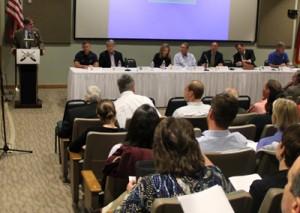The public was asked to provide input in the process to help assess the damage to the Alabama coast from the Deepwater BP oil spill at a meeting on November 11 in Spanish Fort, AL.
More than 50 members of the public attended to hear from representatives of the trustee agencies responsible for the natural resources impacted by the BP spill. Elected officials from Dauphin Island, Spanish Fort, Daphne, Gulf Shores, and Rep. Jo Bonner's office were in attendance.
Admiral Paul Zukunft with the Coast Guard kicked off the meeting with an overview of the initial response to the spill and ongoing clean-up efforts and how that differs from NRDA.
Will Brantley, of the Alabama Department of Conservation and Natural Resources (ADCNR), the state's lead trustee agency for the spill, provided an overview of the Natural Resource Damage Assessment (NRDA) process and ways the public can be involved.
"The goal of NRDA is to return injured natural resources to their pre-spill condition and compensate the public for the time period that services were impacted," Brantley said. "NRDA is focused on restoration."
In addition to attending meetings and providing comments, members of the public can be a part of the NRDA process by providing restoration project ideas and feedback to draft restoration plans, Brantley said.
Representatives from ADCNR's Commissioner, the Geological Survey of Alabama, and the U.S. Fish & Wildlife Service answered questions, many of which focused on human use of natural resources, an issue of particular interest to Alabamans.
"Human use of the natural resources includes going to the beach, enjoying the sand, swimming, fishing, and bird watching," said Will Gunter of ADCNR. "Valuing that loss is difficult, but the trustees are working to figure that out."
"Some of the ways we can restore for those losses include making it easier for people to enjoy the resources such as building boat launches," he said. "And the public will be compensated for the time the resources couldn't be used."
The NRDA for the BP spill does not have a set timeline and may take years. But restoration is considered early in the process, said Pete Tuttle of the U.S. Fish & Wildlife Service.
Additional meetings will be scheduled, and information will be posted on our calendar.


